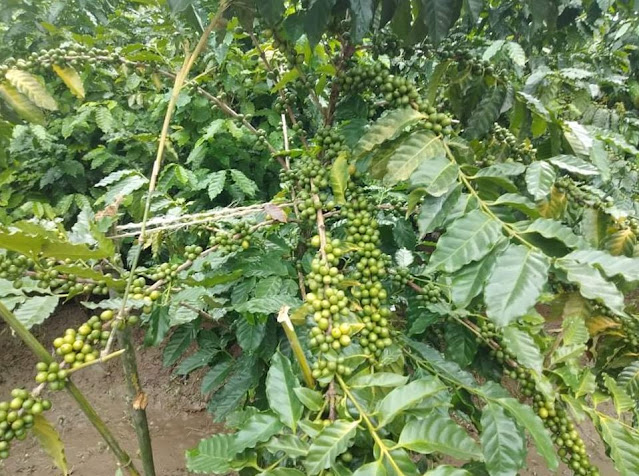Although several coffee gardens were established in the hill districts of the country in the last few years, this is the first for coffee cultivation in North Bengal
A cup of hot tea or coffee at the end of a busy day invigorates the body and mind instantly. Caffeine in tea and coffee relieve fatigue and help to keep the mind cheerful by bringing a refreshing feeling into it.
Coffee is the second most popular hot drink after tea around the world. Its popularity has been increasing by the day in Bangladesh as well.
According to the Department of Agricultural Extension, as tea cultivation is now being expanded in the northern region, the soil in the region is comparatively less drought prone and so there is bright potential for coffee cultivation in the northern district of Rangpur.
Although the country has a long and successful history of tea cultivation, the introduction of coffee cultivation in the region is a relatively recent happening.
Agriculture experts believe there is a bright prospect of coffee cultivation now and through which local demand could be met while also reducing import dependency.
Although several coffee gardens were established in the hill districts of the country in the last few years, this is the first for coffee cultivation in North Bengal.
Meanwhile, coffee cultivation is being expanded in various districts of the north with the help of some enterprising farmers.
Mokhlesur Rahman is one such enterprising youth from Goalbari village of Taraganj upazila.
He first started cultivating coffee in 2017 by procuring 800 coffee seedlings from a nursery in Cox's Bazar. About a year and a half later, the first coffee flowers started appearing on just a few of the plants in the garden, and he was able to collect 5kg of dried coffee beans.
He first harvested the ripe beans and removed the husks. Then he cleaned them and dried them in the sun.
The dried beans were then put inside a sack and beaten with a stick to break the thin hard covering on the seeds.
Then the beans were roasted in the oven and finally ground.
He kept some of the powdered coffee beans for himself and distributed the rest among his relatives. The taste and aroma of his coffee seemed similar to other packaged coffees on the market.
Talking to Dhaka Tribune, Mokhlesur Rahman said he had planted coffee out of curiosity. “But since the flowers and fruits came last year, I’ve been very happy about the prospects of commercial coffee cultivation.”
This year, about 450 plants in his orchard have borne fruit and he expects to get 25-30kg of dried coffee beans, he added.
Moreover, from the seeds collected this year, he intends to expand the orchard to about one and a half acres by growing seedlings commercially. Seeing the success of his coffee cultivation, many people in the area are becoming inspired. In the beginning, due to lack of proper knowledge about coffee cultivation, the farmers could not take proper care.
Later, upazila and district level officials of the Department of Agriculture Extension started regularly visiting the orchards and applied fertilizers at the base of the trees, lime to retain partial acidity of the soil, drainage system, leaf rust, anthracnose, fruit borers, etc.
According to the Upazila Agriculture Department, hot (20°C-30°C) and humid climate and 150-200cm rainfall is appropriate per year for coffee cultivation. However, dry weather is required during the fruit ripening season. Mildly acidic and fertile reddish loam soil rich in iron, potassium, nitrogen and organic matter is ideal for coffee cultivation. It is also necessary to plant shade trees such as ipil ipil, acacia and banana in the garden to protect the coffee plant from the intense sunlight.
Speaking on the matter, Upazila Agriculture Officer Urmi Tabassum said: "The soil and climate of Taraganj upazila are suitable for tea and coffee cultivation. As a result, several tea gardens have already been established and there is huge potential for coffee cultivation here at present."
If farmers can market it at fair prices, opportunities will be created to cultivate coffee commercially in Taraganj and thus the coffee produced in the region will be able to meet local demand as well as reduce import dependency, she added.
Sarwarul Alam, deputy director, Department of Agriculture Extension, Rangpur, said the soil and climate in Taraganj upazila and its adjoining upazilas were suitable for coffee cultivation.
“Ideally, coffee is planted in well-drained soil conditions that favour rich organic matter that is slightly acidic,” he added.
He cited the success story of Mokhlesur Rahman, the farmer from Taraganj, and said that Mokhlesur had achieved great success by cultivating coffee on his land. The Department of Agricultural Extension has been assisting him with various types of advice.
He said the agriculture department had now taken an initiative to produce coffee seedlings on a large scale and supply them to the surrounding districts at reasonable prices. It is expected that the coffee produced in the region will be able to meet half of the country's demand in the next five years.
https://www.dhakatribune.com


Post a Comment
We love to hear from you! What's on your mind?